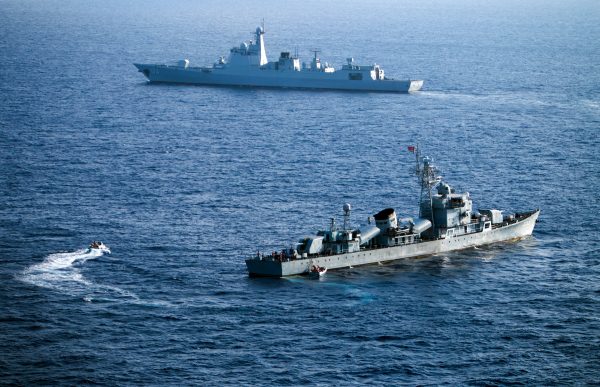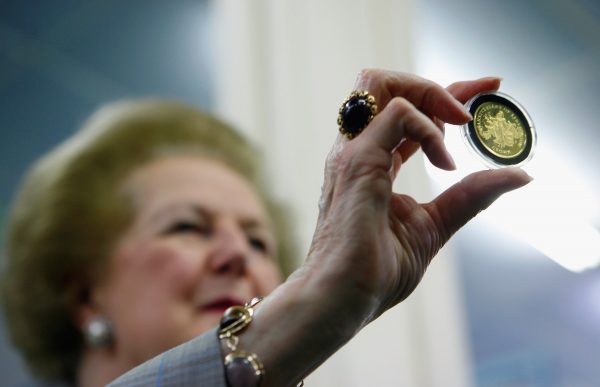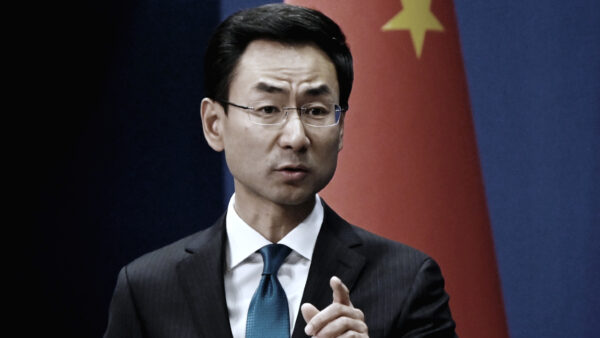China and Argentina are picking at an old wound. They called Britain colonialist for supporting the 99.7 percent of Falkland Island residents who voted to stay British in 2013. Turnout for the referendum was over 90 percent. Britain has an earlier claim to the islands than Argentina, but that doesn’t really matter. What matters is that the overwhelming majority of 3,500 people who live in the Falklands today, including ethnically and culturally-diverse families, women, and children, want to remain part of Britain.
Argentina’s GDP per capita was about $9,900 in 2019, and its economy is a mess, having declined about 30 percent between 2017 and 2019, before COVID-19 hit. So, one can understand if the country wants to grab a nearby territory with lots of fishing, oil, and gas resources. Britain’s GDP per capita was about $42,000 in 2019, and it did very well against COVID-19. Both are reasons enough for Falklanders to want to stay British.
China and Argentina’s current leftist government claims that the people who live in the Falklands today are “colonialists.” But according to the last census in 2016, for every British-born resident in the Falklands, there are approximately 1.6 Falkland residents born in the Falklands itself. Sure, they came from somewhere else originally. But so did most Argentines. Over 97 percent of Argentines are of European or mixed European-Amerindian ancestry.
Now that hundreds of years have passed, it shouldn’t matter what color you are, or what language your ancestors spoke. Too much water has passed under those bridges to go back.
The history of the world is the history of migrants finding new homes. People move. They migrate. They settle. Sometimes they war against prior inhabitants, which is horrible and wrong. Sometimes they commit genocide, which is a crime against humanity that should be prosecuted to the fullest extent of the law. Europeans are not exempt from such crimes, or the other violent excesses of colonialism. But those were different times. The families who lived in the Falklands in 1982, the last time Argentina launched a war against the islands, and the ones who live there now, were never violent colonialists. They deserve a break from the land-hungry “leftists” in Beijing and Buenos Aires.
The allegation of European colonialism and imperialism, since at least 1916 when Lenin and other communists started to politicize it for their own ill-fated purposes of authoritarian revolution and territorial expansion, is not always a rational charge. The Chinese Communist Party (CCP) has used it since around 1921 to expand its territory, first against Chinese nationalists, then the Japanese, then the British in Hong Kong, and now against American “imperialism” in all of Asia if not the world. Meanwhile the CCP seeks to replace America through aggressively buying up global ports, establishing military bases in Africa, and taking over the U.N. with its checkbook diplomacy. The CCP and its global expansion is a voluble new imperialism under a different name.

But the CCP’s mix of its own imperialism, along with “anti-colonialism” and “anti-imperialism” where convenient, is an illogical and outmoded communist stew used to try and push back other populations while expanding Chinese territory and spheres of influence. When this anti-imperialism can’t be used, for example against Vietnamese and Filipinos, other ideas are invented to justify expansion, such as the nine-dash line claiming almost the entirety of the South China Sea, or “teaching Vietnam a lesson” in China’s 1979 war of aggression against the CCP’s communist brothers to its south.
Now that China’s aims are global, populations in places as far-flung as the Falkland Islands can be softened-up with allegations of colonialism, even if done in concert with other originally colonial populations in Argentina. Spanish and Italian colonialists in Argentina will have their turn at the CCP guillotine after the British Falklanders are dispatched. China uses a racialized divide-and-conquer strategy against guileless Europeans-turned-nationalists around the world who feel guilty about their history and are now bending over backwards to do the right thing. Only, they’re confused about what the right thing to do is when confronted with Chinese communists who are spewing ideology and dogma so fast that in the meantime they’re stealing your lunch. Democracies should be closing ranks in defense of themselves, their wonderful diversity, and the liberties that they enjoy.
To put CCP claims of colonialism in context, remember that when Chinese were the colonists, for example in Singapore or Malaya in the 18th and 19th centuries, there is no such CCP outrage against the contemporary Chinese inhabitants of these countries. Few today know the sometimes violent history of Chinese colonists in countries like Singapore and Malaya. We are all too busy reading our own history of colonial violence.
The CCP works hard to defend the Chinese diaspora around the world against any perceived wrong. Chinese immigrants, according to the CCP, build model governments of authoritarian efficiency, as in Singapore, or are courageous freedom fighters against colonialism, as in Malaya in the 1950s.
But Singapore is actually a Chinese-led dictatorship with draconian corporal punishment, and the mostly-Chinese Malayan Communist Party (MCP) in the 1950s almost exclusively attacked European colonists, who were supported in the war by the Malay and Indian populations. The political discourse surrounding global colonialism has been so biased by leftist historiography that it is politically incorrect to note these facts.
The Chinese communist insurgency in Malaya, which was supported by the CCP and exclusively targeted Europeans, was an anti-European racist war by Chinese colonists, just as colonists of different European extractions fought each other over the Falklands in the 18th and 19th centuries. But unlike Britain, the CCP today is still a highly racist and sexist organization that only advances males of the Han race into China’s top-seven politburo leadership positions.
Conversely, Britain’s government currently enjoys the services of Chancellor of the Exchequer Rishi Sunak, Home Secretary Priti Patel, COP26 President Alok Sharma, Secretary of State for Business, Energy and Industrial Strategy Kwasi Kwarteng, Secretary of State for International Trade Elizabeth Truss, Secretary of State for Work and Pensions Thérèse Coffey, Leader of the House of Lords Baroness Evans, and Minister without Portfolio Amanda Milling. These are the supposedly “racist and sexist” British conservatives. Wait until the next Labour government rolls around to see yet more diversity in Britain. The country’s incredible modern inclusion of diverse global populations, and gender diversity in its government, is another good reason for Falklanders to want to stay British.
With the rise of democracy and the principle of self-determination and diversity embraced by Britain and the United Nations after World War II, there is no more British colonialism on the Falklands. Rather, what remains is a relatively independent territory in voluntary alliance with Britain and other self-determining democracies. The population of the Falklands is pleasingly diverse, including 325 Spanish speakers, 73 Shona (Zimbabwe) speakers, 64 Filipino speakers, and 26 French speakers, according to the last census in 2016. The new imperialists in Beijing and Buenos Aires don’t highlight these proudly diverse statistics.
Falklands history is also one of diverse discoverers and settlements. John Davis, an English navigator of the Desire, was possibly the first person to sight the Falkland Islands, in 1592. The Dutchman Sebald de Weerdt definitely saw them around 1600. The first to land on the Falklands was John Strong, an English captain, in 1690. He named the Falklands after a British naval official. The French were the first to settle the Falklands, in 1764. The French called the islands the Îles Malouines. One year later, the British settled West Falkland.

The Spanish bought the French settlement in 1766, settled it, and drove out the British by force in 1770, though the British maintain that they returned in 1771 and then left three years later to save money. A 1790 treaty between Spain and Britain reserved all of South America’s coasts, including the Falklands, to Spain. Buenos Aires rebels defeated Spain in 1816, and in 1820 the Buenos Aires government claimed the Falklands. Britain and the United States, which used the islands for fishing, were a bit late in their objections, which started in 1829, with an assertion of British rights to the islands. The United States followed with an objection in 1831 due to Argentina’s attempt to regulate the Falkland fisheries. In 1831, after repeated and exceedingly polite warnings, Argentina seized three U.S. ships for sealing in the region. The United States and Britain responded with military force in 1831 and 1833, expelling the Argentines. Several years later, a self-supporting British colony of approximately 1,800 people was thriving.
But that violent history is all in the past now. The Falkland Islanders of today did not engage in that violence, and have the right to vote their allegiance to whomever they choose. They’re a diverse democracy, and they have for the time being chosen to remain British. But Argentina, backed by China, will not let it rest.
The South American country raised the issue at the United Nations in 1964, when Argentina appealed to papal bulls of 1493 in which Spain and Portugal divided the Americas between themselves. What a farcical argument given that no person, let alone a Spaniard or Portuguese, had ever been recorded as having even seen the Falklands at the time of the bulls.
Having failed at persuasion in 1964, Argentina tried again in 1982, this time with military force. Their invasion was repulsed by Margaret Thatcher’s British expeditionary force, after which local democratic institutions were strengthened. It was a horrible war in which over 900 soldiers, mostly Argentines, and three Falklands civilians, lost their lives. In 2016, a U.N. commission ruled that the Falklands lay in Argentine waters, which would deprive the Falklands of 1.7 million square kilometers of maritime territory and up to 60 billion barrels of oil reserves. Given that the Falklands has always been a fishing community, and oil is the new way to make money on boats, it hardly seems fair that Falklanders should be deprived of their maritime resources. It isn’t the first time that the U.N. has made ridiculous maritime decisions that benefit China and its allies. In 2016, in an otherwise reasonable ruling, the Permanent Court of Arbitration gave China and Vietnam joint fishing rights with the Philippines over Scarborough Shoal, a miniscule rock of an island that lays well within the Philippines’ exclusive economic zone (EEZ).
After its own imperialism over Scarborough, China is hypocritically pushing its anti-colonial narrative, callously picking at an old wound that has real-world consequences for the families living in the Falklands today. Perhaps China is using Argentina to get back at Britain for Britain’s support of Hong Kong, which would also doubtless prefer to be British rather than suffer the loss of its liberties under Beijing’s thumb. Perhaps Beijing just wants to smear Britain in the media. It seems to have a permanent animus against the country, along with an even bigger animus against the United States, Britain’s closest ally. The CCP could still be angry at Britain over the Opium Wars of the 19th century, in which Britain forced opium sales into China. But those wars are all over 150 years old. It’s time for the CCP to end its self-serving historical grudges, or it could start a war.
Argentina is gravitating into an alliance with China against Brazil, and the Falklands is something of a global leftist target. When the current Argentine president, leftist Alberto Fernández, took office in 2019, he promised to strengthen Argentina’s claims over the Falklands. The Cuban president attended the ceremony. Brazil’s rightist president, Jair Bolsonaro, called Fernández a “red bandit” and refused to attend. The world is shaking out into pro-and-anti China camps. Beijing should take notice and cool it. But that doesn’t seem to be in the cards.
China’s Deputy Permanent Representative to the U.N., Geng Shuang, denounced Britain as colonialist on June 24 at the U.N. Special Committee on Decolonization. Geng is apparently in coordination or support of Argentina, which “is trying to use the session to resume negotiations with Britain over the sovereignty of the islands,” according to the South China Morning Post.

According to Geng, China “firmly supports Argentina’s sovereignty claim on the Malvinas,” which is the Argentine name for the Falklands. The Chinese representative demanded that Britain “actively respond to Argentina’s request” for a “dialogue” on the matter. China refuses to recognize the will of the people currently living on the Falklands, instead attempting to instigate a fight between Britain and Argentina. This fits China’s general divide-and-conquer strategy.
“Today in the 21st century, the days when Western colonialists had free rein are long gone,” opined Geng. Entirely hypocritically, Geng said, “However, in international relations, colonial thinking, power politics and bullying—which share their origins with colonialism—still manifest themselves in various forms, and have a serious impact on global order, severely undermine the sovereignty, security and development rights of the countries concerned, as well as their political, economic, and social stability.”
This statement is ahistorical, as the era of European colonialism to which Geng refers in no way originated power politics. Millenia of power politics preceded the 16th to 19th centuries, including in China, which Geng well knows as any Chinese diplomat will be versed in the Warring States Period of 475 to 221 B.C.E. But power politics has a much more ancient origin, as found in prehistoric archaeological finds globally that evidence war and genocide.
One Chinese international relations expert argued that China’s recent U.N. statement was hitting back at Britain for its support of human rights and freedom of the seas. “The UK has recently been making military moves—including carrying US fighters on its carriers and intervening over the South China Sea issue—and also making a fuss about Hong Kong,” Sun Qi told the Post. “China is attempting to reverse the narrative to hit back at them.”
China’s dredging up of the Falklands issue to “hit back at” Britain, almost 40 years after the last war initiated by Argentina, is irresponsible, dangerous, and true to its authoritarian form, ignores the wishes of the Falkland island residents, who should be most distressed at China and Argentina’s revival of the dispute. If China truly wants to contribute to peace and security in the world, it ought to support what the Falklands people want, rather than use the people as cannon fodder and bargaining chips in a vengeful manner, and for its own expansionary aims.
The current conflict over the Falklands is not really about anti-colonialism. If Argentina’s 1982 war against the Falklands was an anti-colonial battle, it was one group of colonialists against another. But it was not an anti-colonial battle. It was an Argentine military strongman, facing opposition to his rule and a slumping economy, and trying to hold onto power through territorial expansion. He failed, got people killed, and was deposed three days later. Now Beijing and Buenos Aires are treading the same bloody path.
Today’s grandstanding over the Falkland Islands is about authoritarianism, land-grabbing, and the economy. Argentina’s economy shrunk by an astonishing 30 percent between 2017 and 2019, and another 10 percent in 2020. It is much worse-off than in 1982. Rather than allow President Fernández to froth up an old conflict to distract from his economic failures, Argentine voters should dump him.
Beijing is a dangerous buddy that encourages its “friends,” like Myanmar, North Korea, Iran, and Russia, to do evil things that gets them ostracized from the international community. Down that road lies violence, poverty, and despair for Argentina. Before starting another needless war, Argentinians should focus on their real challenge: lifting themselves up by their bootstraps rather than appealing to genocidal dictators in Beijing for “help.”
Meanwhile, the United States should be a better friend to Britain. Margaret Thatcher should not have had to go it alone to defend the Falklands in 1982. The United States should have been at her side from the beginning, and before the war started with joint forces on the island to show resolve and commitment. If Britain requests military assistance at the Falklands in future, the United States should be willing and ready.

